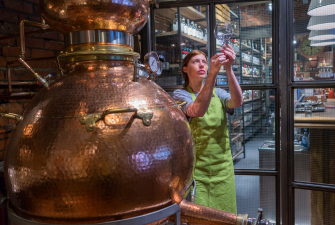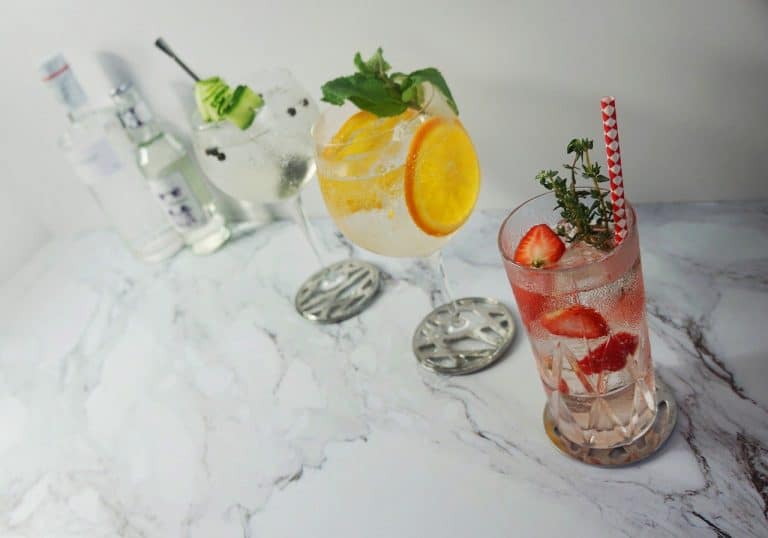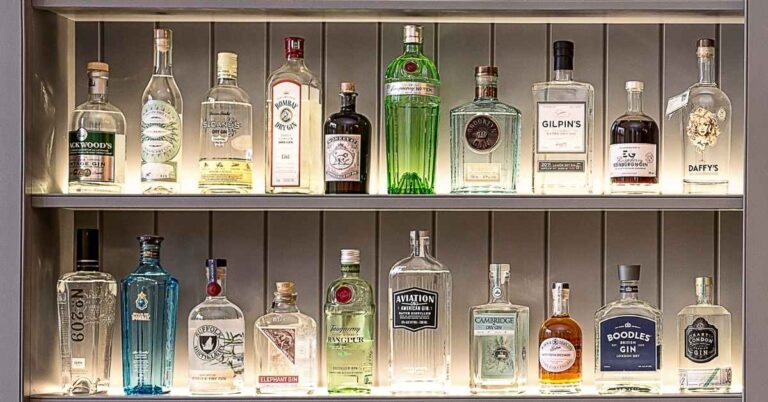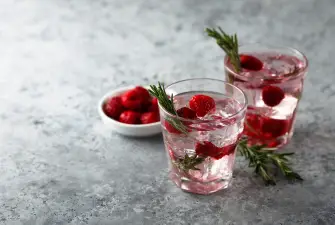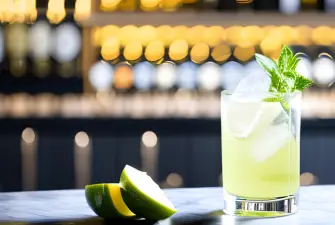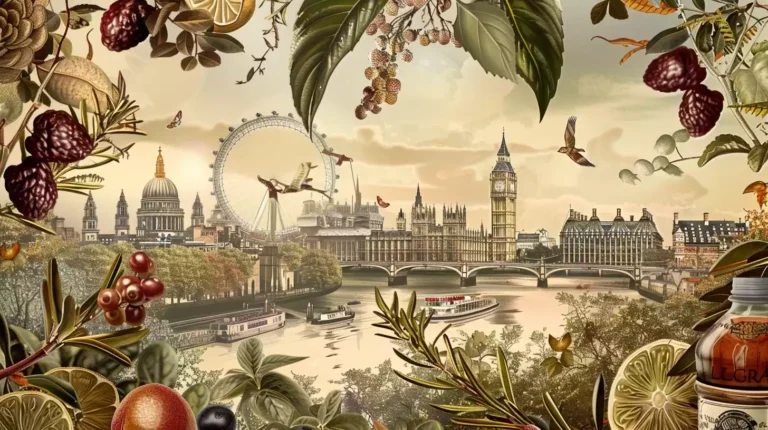Can Gin Evaporate? The Effects And How To Prevent It
Ever wondered if gin could vanish into thin air?
The concept of gin evaporating raises questions about its composition and behavior in different environmental conditions.
Consider the science behind this process and how it could impact your favorite spirit.
Let’s understand the mysteries of gin and its potential to disappear, revealing insights that might change your view of this beloved beverage.
Continue Reading to Understand These Key Points:
- Gin can evaporate due to alcohol molecules gradually escaping when exposed to air.
- Evaporation alters gin flavor, weakening its taste over time.
- Proper storage in cool, dark places minimizes evaporation effects.
- Understanding factors like temperature and container material helps control gin evaporation.
Gin Evaporation Process
Gin undergoes a gradual evaporation process when exposed to air, affecting its flavor profile over time. While gin itself doesn’t evaporate, the alcohol within it does.
As the bottle is opened and the gin is exposed to air, the alcohol molecules start to slowly evaporate. This evaporation process is gradual but can have a significant impact on the overall taste of the gin, especially if left exposed for extended periods.
The evaporation of alcohol from gin can lead to flavor loss and changes in the composition of the spirit. Over time, the evaporation of alcohol can result in a weaker taste and a less complex flavor profile.
It’s recommended to store gin in a cool, dark place and consume it within a reasonable time frame to preserve its quality. The evaporation process is a natural occurrence in gin, and understanding how it affects the spirit can help in maintaining its optimal flavor.
Factors Affecting Gin Evaporation
When considering the factors affecting gin evaporation, it’s crucial to explore the influences on the evaporation rate, such as temperature variations and humidity levels. These elements can significantly impact how quickly gin evaporates when exposed to air.
Additionally, the material of the container storing the gin can also play a role in the evaporation process.
Factors Influencing Evaporation Rate
Influential factors affecting the rate of evaporation of gin include temperature, humidity levels, and air circulation. Alcohol evaporates more rapidly in higher temperatures and lower humidity environments, leading to increased evaporation rates.
Exposure to direct sunlight or heat sources can further escalate the evaporation process.
To mitigate evaporation, storing gin in a cool, dark place with stable temperatures is crucial. Properly sealing the gin bottle also plays a significant role in reducing evaporation and maintaining the gin’s flavor profile over time.
Ensuring minimal temperature fluctuations in the storage area can assist in preserving the gin by minimizing the evaporation process.
Temperature and Humidity Effects
Temperature and humidity levels significantly affect the evaporation rate of gin. Higher temperatures increase the kinetic energy of gin molecules, causing faster evaporation.
Lower humidity levels in dry environments reduce moisture capacity, leading to quicker evaporation. Temperature fluctuations can result in varying evaporation rates for gin.
Properly managing storage conditions in a cool, stable environment with moderate humidity levels is essential for controlling evaporation and maintaining gin integrity.
Container Material Impact
The material of the gin container significantly impacts the rate of evaporation. Glass containers are less permeable than plastic ones, providing a more impermeable barrier that reduces gin evaporation over time.
Plastic bottles, being more porous, allow for a faster evaporation rate. When storing gin, it is important to consider the container material to minimize evaporation.
| Material | Permeability |
|---|---|
| Glass | Less |
| Plastic | More |
Impact of Air Exposure on Gin
Exposure to air can significantly impact the flavor profile of gin over time, potentially degrading its taste. When gin is exposed to air, chemical reactions occur that alter its aromatic compounds, resulting in a less vibrant taste.
Factors to consider include the oxidation process, which breaks down flavors, evaporation of volatile compounds leading to diminished aroma, and proper storage techniques like sealing the bottle tightly and refrigeration to preserve flavors.
Can Gin Lose Alcohol Content?
When left open for extended periods, gin can undergo a process where it loses its alcohol content through evaporation. Alcohol evaporation can occur due to various factors such as temperature fluctuations, exposure to air, and storage conditions.
These elements contribute to the gradual dissipation of alcohol content in gin, impacting its flavor profile and overall potency.
Monitoring the environment in which gin is stored and ensuring proper sealing of bottles are crucial in preventing significant alcohol loss. Evaporation alters the chemical composition of gin, affecting its taste and diminishing its alcoholic strength over time.
To maintain the original alcohol content and flavor integrity of gin, it’s essential to store it in a controlled environment and seal containers tightly.
Preventing Gin Evaporation
To prevent gin evaporation, ensure the bottle is tightly sealed. Follow these key measures for effective prevention:
- Proper Sealing: Seal the bottle tightly after each use to prevent air from entering and reduce evaporation.
- Storage Conditions: Keep the gin bottle in a cool, dark place to avoid heat and light exposure, preserving flavors and minimizing evaporation.
- Use of Sealed Bottles: Consider using specially designed sealed bottles for long-term storage to minimize evaporation and maintain gin quality.
Storing Opened Gin Properly
Properly storing opened gin in the fridge can significantly extend its shelf life and preserve its flavor. Ensure the bottle is tightly sealed to prevent evaporation and flavor alterations. Consume opened gin within a year of opening for optimal taste.
Store in a cool, dark place away from heat sources and sunlight to maintain quality. Transferring leftover gin to a smaller container can reduce air exposure, preserving the flavor.
Follow these storage practices to enjoy the full flavor of gin for an extended period after opening.
Testing Gin for Evaporation
Testing for gin evaporation involves monitoring volume or weight changes over time to detect any gradual losses from exposure or improper sealing. To accurately test, use precision instruments like a digital scale or graduated cylinder.
Start by recording initial measurements of the sealed gin bottle as a baseline. Ensure the bottle is properly sealed to prevent external influences on the test results.
Final Thoughts
While gin doesn’t evaporate in the traditional sense, extended exposure to air can lead to flavor degradation. Proper storage and consumption within a year are essential to maintain the original taste.
Storing an opened bottle of gin in the fridge resulted in a noticeable difference in flavor compared to one left out in the open.
Following these guidelines ensures a delightful gin-drinking experience.

